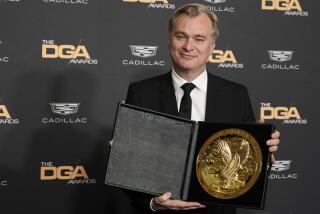Newsletter: Indie Focus: Going the distance with more from Cannes, ‘War Machine,’ ‘Wakefield’ and ‘Manifesto’
Hello! I’m Mark Olsen, and welcome to another edition of your regular field guide to a world of Only Good Movies.
Shortly after we send out this week’s newsletter, the prize winners of this year’s Cannes Film Festival will be announced. Regardless of who walks away with the festival’s top awards, Cannes always serves a vital role in setting the screen for what many of the top films on the festival and arthouse scene will be for the year to come. And this year has likely been no exception.
Kenneth Turan talked to Noah Baumbach about his new “The Meyerowitz Stories (New and Selected)” and Al Gore about “An Inconvenient Sequel.” Justin Chang spoke to Claire Denis about her “Let the Sunshine In” and asked whether Nicole Kidman and Colin Farrell are the king and queen of Cannes. And Steve Zeitchik spoke to Andrey Zvyagintsev about his “Loveless,” Josh and Benny Safdie about “Good Time,” and Alejandro G. Iñárritu about ”Carne y Arena.”
Even though she has not made a movie since “Ishtar,” 1987’s satire of show business and geopolitics, the legacy of Elaine May is still being considered. And she becomes only more vital and influential each passing year, with her trenchant, incisive sensibility slicing right through people’s exterior posturing to reveal the real, soft stuff inside. The films of Elaine May matter, more and more all the time, and so it is exciting to see both her first film, 1971’s “A New Leaf,” playing along with “Ishtar” at L.A.’s New Beverly. If you have never seen either of these brilliant movies, give yourself a little treat and go.
And we have booked a pair of films that premiered at Sundance earlier this year for screening events in June. Both of them are movies you want to talk about when they’re done, and so I am very excited for the Q&As that will follow the movies. To find about more as things are announced, go to events.latimes.com.
‘War Machine’
There has been a lot of talk coming out of Cannes this year about the impact of Netflix on film festivals. And now they drop one of their biggest movies yet with the dark satire “War Machine,” directed and adapted by David Michôd, starring Brad Pitt and based on Michael Hastings book “The Operators” on the U.S.’s recent ill-fated excursions in Afghanistan. Though the film may have mixed notices overall – which may explain its absence from Cannes – it has gotten strong reviews from many top-shelf critics.
For The Times, Kenneth Turan said in Brad Pitt’s performance as a fictional U.S. commander, a “combination of comedic skills and movie star persona [are] put to excellent use here. His canny but doltish McMahon has the difficult task of being in effect a cartoon character placed in real-world places where his decisions get people killed. Places like Afghanistan.”
For the New York Times, A.O. Scott added, “‘War Machine’ effectively rebuts the evergreen notion that military leaders are held back from victory by politicians and bureaucrats. It’s not that the political and diplomatic aspects of American policy are excused, but rather that failure, to reverse the old saying, has a thousand fathers… Is he ridiculous or noble? A little of both, perhaps.”
For the AP, Lindsey Bahr noted that rather than through Scoot McNairy’s journalist character’s voice-over, “where ‘War Machine’ really finds its stride, however, is in the human margins outside of the reporter’s purview — especially in scenes involving the young soldiers on the ground who are haunted and conflicted by the confusing and unspecific directives given to them to execute this confusing and unspecific war.”
At Time, Stephanie Zacharek noted of Pitt and his character, “even if McMahon is appalling half the time, as Pitt plays him--surveying every fouled-up turn of events with a stern squint--it’s not hard to feel some grudging respect for him. Struggling to clarify a mission that will be eternally murky, he’s a man fighting himself more than any perceived or real enemy.”

‘Wakefield’
Adapted from an E.L. Doctorow short story, “Wakefield” is written and directed by Robin Swicord and stars Bryan Cranston and Jennifer Garner. Cranston plays a man who walks out on his stable life and loving family to take up residence in an abandoned attic nearby.
In his review for The Times, Robert Abele wrote, “‘Wakefield’ remains oddly watchable, like a Cheever-esque ’60s-era suburban melodrama that’s slick, unreal, yet has a burrowing drive. You can simultaneously recognize it as a misfire and want more movies like it.”
The Times’ Amy Kaufman spoke to Swicord about the long 10 years since she directed “The Jane Austen Book Club.” Swicord noted: “I was naive enough to think that if you exhibit competence in something, the movie makes some money and people are happy, that you move onto something of equal size — or larger… No jobs came to me. Zero. Lost, in every case, to a man.”
At the L.A. Weekly, April Wolfe wrote: “Swicord turns what could be a dark or one-note premise into a sometimes-charming, sometimes-heartbreaking meditation on a man’s loss of self after having set out to conquer the job, wife, house and kids he thought would make him happy.”
‘Manifesto’
Who doesn’t like Cate Blanchett? How about Cate Blanchett in 13 roles? Having begun as a multi-screen art installation and a collaboration between German artist Julian Rosefeldt and the actress, “Manifesto” has now been transformed into a single, linear film. Blanchett reads 13 famous manifestos from 20th century art movements, playing a different character in each vignette.
Times art critic Christopher Knight said the film’s subject “is as much Cate Blanchett, its star, as it is the radical manifestos by more than 50 Futurists, Dadaists, Suprematists, Conceptual artists and others that anchor the movie’s 13 vignettes… Rosefeldt crosses documentary and theatrical forms, bringing to life words mostly by 20th century artists.”
For The Times, Sheri Linden called the film “a blast of fresh air. And like many of the gauntlet throwers it cites, it risks looking foolish and, in the process, creates something gorgeously defiant.”
Also for The Times, Lisa Fung talked to Blanchett and Rosefeldt about their collaboration and reconfiguring the installation as a film. “We thought it would be very easy, but we essentially had to start again from scratch,” Rosefeldt said. “It was about creating — due to the absence of a real story — a visual story that would guide you through the film.”
Email me if you have questions, comments or suggestions, and follow me on Twitter @IndieFocus.
More to Read
Only good movies
Get the Indie Focus newsletter, Mark Olsen's weekly guide to the world of cinema.
You may occasionally receive promotional content from the Los Angeles Times.







